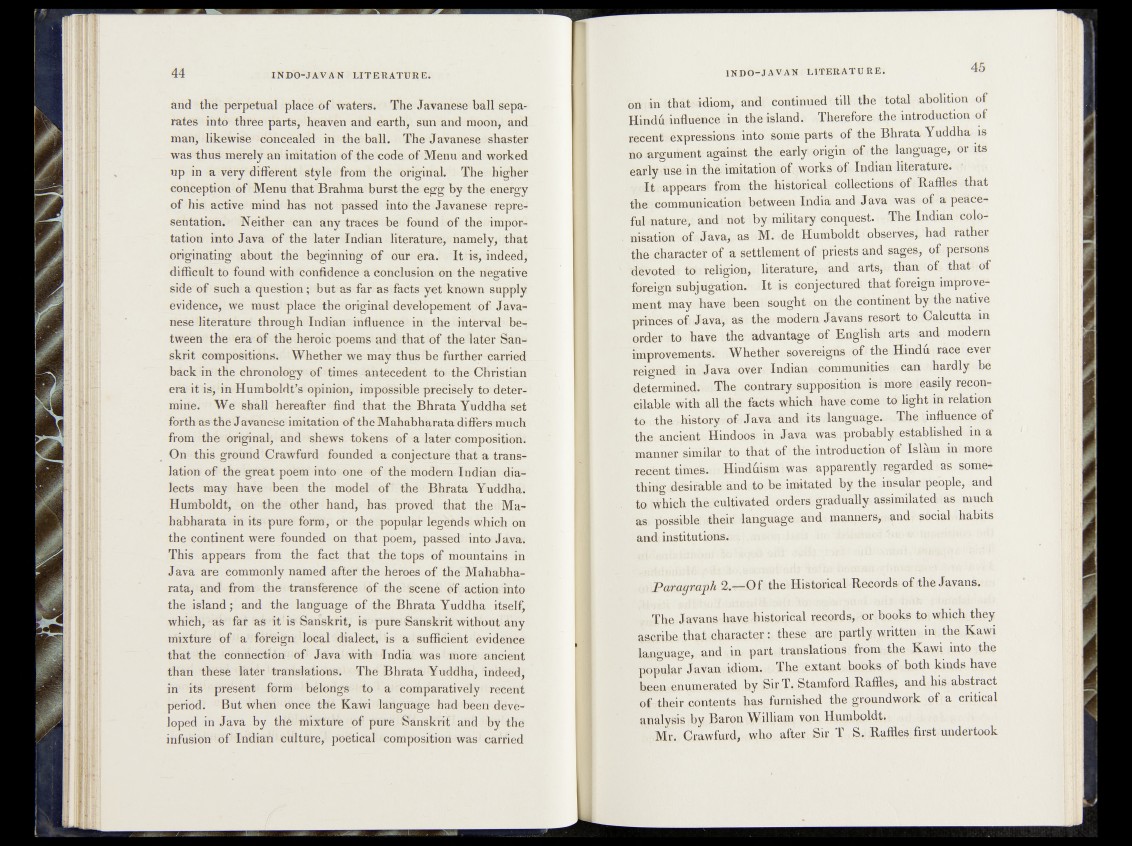
and the perpetual place of waters. The Javanese-ball separates
into three parts, heaven and earth, sun and moon, and
man,;likewise concealed in the ball. The Javanese shaster
was thus merely an imitation of the code of Menu and worked
up in a Very different style from £ the original. The «higher
conception of Menu that Brahma burst the egg by the energy
of his active mind has not passed into the Javanese ^representation.
Neither can any^traces be foundiof tbeï impoti*
tation into Java of the later Indian literature, namely, that
originating about the beginning of our era. It is, indeed,*
difficult to found with confidence a conclusion on the negative
side of such a question; but as far as facts yet known supply
evidence, we must place the original devetopement of Javanese
literature through Indian influence in the interval ben
tween the era of the heroic poems and that of the later Sanskrit
compositions. Whether We maythus he further-carried
back in the chronology of times antecedent to the Christian
era itis^ in Humboldt’s opinion, impossible preëisely to deiéïfc
mine. We shall hereafter find that the Bhrata Yuddha set
forth as the Javanese imitation of the Mahabharata differs much
from the original, and shews tokens of a later composition.
On this groimd Crawfurd founded a conjecture that a translation
of the great poem into one of the modern Indian dialects
may have been the model ofr the Bhrata Ysuddlia.
Humboldt, on the other hand, has. proved that the Mahabharata
in its pure form, or the popular legèftds which on
the continent were founded on that poem, passed into Java.
This appears from the fact that the tops of mountains in
Java are commonly named after the heroes of thé Mahabharata,
and from the transference of the scene of action into
the island; and the language of the Bhrata Yuddha itself,
which, aS far as it is Sanskrit, is pure Sanskrit without any
mixture of a foreign local dialect, is a sufficient evidence
that the connection of Java with India was more ancient
than these later translations. The Bhrata Yuddha, indeed,
in its present form belongs to a'"comparatively recent
period. But when once the Kawi language had been developed
in Java by the mixture of pure Sanskrit and by the
infusion of Indian culture, poetical composition was carried
on in that • idiom, and continued till the total abolition of
Hindu influence tin the island. Therefore the introduction of
recent expressions; into some parts of the Bhrata Yuddha is
hoarguthent against the. eariyUotigi%of.the language,, or its
early use in the« imitation of^works of Indian literature, (j
, It appears from the historical? collections of Raffles that
the communication? between India and Java was of a pedce«
fid nature; and not by military conquest.^ The Indian colo-
nisation of Java, as M ;d e HtiwbdldtiobsmF^i had rather
the character of a settlement of priests and sages, of persons
devoted to religion, literature, and arts, than |of that of
foreign subjugation. It is Conjectured that foreign improvement
may have|been soughtron; the.continent by the native
princes of Java, as theifuOdera Javans resorfe tojGaleutta m
order to have the advantage of English arts, and modern
improvements. Whether sovereigns of the Hindu race ever
reigned in Java over Indian communities , can hardly be
determined. The contrary, supposition is; more .easily reconcilable
with all the facts which have;eom©ltd light in relation
to the history of Java and fts language The influence of
the ancient Hindoos? in Java was..probably established in a
manner similar to that of tlie introduction of Islam in more
recent times. Hinduism was apparently regarded as some«
thing desirable; and to be imitated by the insular people, and
to which the cultivated orders gradually assimilated as much
as possible their language and manners, and social habits
and; institutions.
i Paragraph 2,-r-Of the Historical Records of the Javans.
The Javanj|«hayo bisfotical reeoTda^til^QfeP to which they
ascribe that character J these aref partly written im . the, Kawi
language, and ..in part translations from , the Kawi into the
popular Javan idiom. The extant books ©f both kinds have
been enumerated by Sir T, Stamford Raffles, and his abstract
of their contents has furnished the groundwork of a critical
analysis by Baron William von Hqmboldt; . : i - : v
Mr. Crawfurd, who after Sir T Raffles first undertook